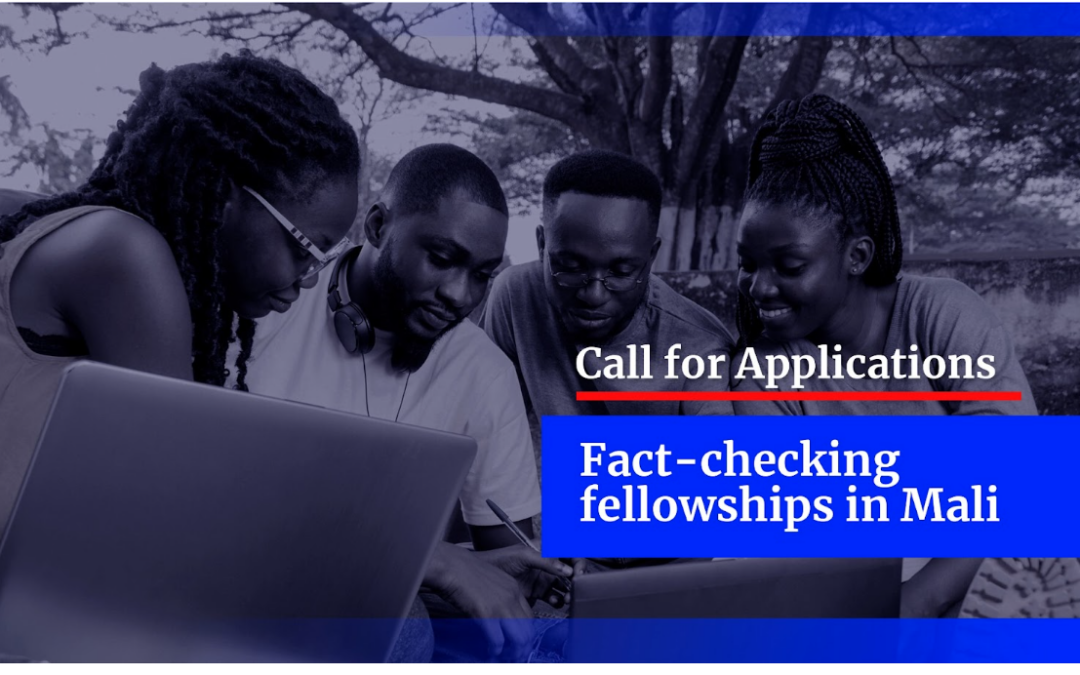Do you want to help counter falsehoods in Mali?
Code for Africa (CfA), through its flagship network the African Fact-checking Alliance (AFCA) is offering stipend-based fellowships to journalists and/or fact-checkers based in Mali. The fellowship aims to help increase resilience to manipulative information within the Malian information ecosystem.
As part of a joint initiative between CfA and USAID, these part-time fellowships are available to journalists and fact-checkers in Mali to support their efforts to strengthen the integrity of information and demystify rumours of mis/disinformation reported in communities in Mali.
The fellowship
For this cohort, CfA will award six, 6-month long stipend-based fellowships to pioneering journalists and/or fact-checkers in Mali to produce fact-checking articles and spotlight the most egregious or toxic disinformation.
The fellows will receive intensive editorial training and mentoring from our PesaCheck, iLAB, and CfA’s African Fact-checking Alliance (AFCA) team through webinars and workshops, which they are encouraged to implement and share with their colleagues and peers within their organisations/newsrooms.
The fellows will use their skills and platform of choice to share and amplify the resulting debunking. The fact-checks can take the form of written, visual or audio, primarily in local languages, with a particular focus on targeting young people.
The details of the fellowship are outlined as follows:
- Number of awards: Up to six Fellows will be selected.
- Duration: 6 months
- Award amount: Each Fellow will receive a suitable monthly stipend.
- Additional support: Fellows will receive hands-on technical training, followed by one-on-one project mentorship by the fact-checking team from PesaCheck, investigative analysts from the iLAB, along with support from CfA’s staff technologists, data analysts, multimedia producers and editors. Fellows will also receive support that they can leverage to either strengthen the CheckDesks/newsrooms they belong to, or initiate flagship CheckDesks within these newsrooms that spotlight the most egregious or toxic disinformation.
- Publishing support: Fellows will publish their project in their ‘home’ media, but will receive support to also publish internationally.
Candidates must meet the following criteria:
- You must be an established journalist or digital storyteller with a minimum of one year working in the media. You must have a portfolio of published work you can share.
- Preferred experience in fact-checking.
- You must be affiliated with a media partner: As such you must publish/broadcast your work in mainstream media.
- You must be fluent in French and preferably Bambara.
- You must have access to a reliable laptop or desktop computer with stable internet connectivity, to be able to participate in program activities and online courses/mentoring.
- You must be based in Mali.
- You must commit to publishing/disseminating your work on an appropriate public platform. CfA will assist with partnerships/syndications where appropriate.
- You must commit to sharing your new skills and knowledge within your organisation, by presenting your projects and techniques to your peers.
- Be available for virtual meetings.
The deadline for applications is 4 March, 2024.
To apply, please fill in this form.
About the Partners:
Code for Africa (CfA) is the continent’s largest network of digital democracy laboratories, with over 100 full-time data scientists, forensic researchers, technologists and digital storytellers working in support of investigative media and watchdog CSO partners in 26 African countries. CfA builds digital solutions that provide actionable information to citizens to encourage informed decisions, while also
amplifying voices to strengthen civic engagement for improved public governance and evidence-driven accountability. CfA will give fellows access to support from its openAFRICA data ‘liberation’ team, the commons.AFRICA open source team, the source.AFRICA evidence research team, and a string of wider communities that CfA manages including the africanDRONE community of civic drone/mapping pioneers, the sensor.AFRICA community that uses remote sensors to monitor air/water/radiation and other environmental information, the PesaCheck fact-checking team that debunks misinformation, the iLAB forensic investigation team that tracks and exposes hate speech or other toxic content, the CivicSignal media monitoring and content analysis team, and the WanaData network of women data scientists/storytellers who liberate and amplify feminist data.
United Nations Agency for International Development (USAID) vision includes leading efforts to invigorate democracy, enhance human rights and justice, and bolster governance that advances the public interest and delivers inclusive development. We shape policy and development agendas, generate knowledge and evidence that drives innovation, catalyze partnerships and coalitions, and mobilize cutting-edge programs and technical assistance to enable USAID’s Missions and partners to accelerate democratic development globally.
Other partners:
Deutsche Welle Akademie (DWA) is Deutsche Welle’s centre for international media development, journalism training, and knowledge transfer. DWA works to strengthen the human right to freedom of expression. Together with their partners, they play a leading role in the development of free media systems, creating access to information, creating access to information, setting standards for education and independent journalism.
Meta formerly named Facebook, Inc., and TheFacebook, Inc. is an American multinational technology conglomerate based in Menlo Park, California. The company owns and operates Facebook, Instagram, Threads, and WhatsApp, among other products and services. Founded in 2004, Meta’s mission is to give people the power to build community and bring the world closer together. People use Meta’s technologies to connect with friends and family, find communities and grow businesses.
The United Nations Development Program (UNDP) is the primary United Nations entity for global development efforts and operates in 170 nations and regions with the aim of eliminating poverty and diminishing inequality. UNDP assists countries in formulating policies, enhancing leadership capabilities, fostering partnerships, strengthening institutions, and cultivating resilience to advance the Sustainable Development Goals. UNDP’s efforts are concentrated within three key areas: sustainable development, democratic governance and peace-building, and climate and disaster resilience.
Germany’s Federal Ministry for Economic Cooperation and Development The BMZ carries out a multitude of tasks. These include planning and programming German development cooperation, cooperating with civil society and the private sector, cooperating with partner countries and with multilateral organisations, and carrying out development information and education work.
